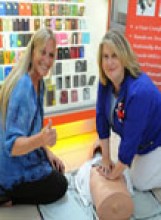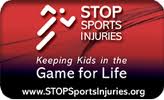Archive for August, 2015
Outdoor Allergy First Aid Kit
Posted by: | CommentsNow that the weather is getting better and we are planning more outdoor activities with our families, you may want to consider carrying a few extra first aid items to help guard and treat any type of an allergic reaction.
Bees, plants and pollens can turn an enjoyable afternoon in the outdoors into a sneeze, itchy and uncomfortable situation. In certain occasions it can be life threatening. By carrying a few essential items you can help combat many of these irritants.
Here are a few items we suggest:
- Moisturizer – Eases skin irritation due to dryness.
- Hydro-cortisone cream – Helps treat itchy skin reactions.
- Eye drops – Can reduce inflammation, reddening, itchy, tearing and swelling of the eyes.
- Decongestants and Nasal Sprays – Reduce the discomfort of nasal swelling and stuffiness.
- Antihistamines – A powerful relief for allergy symptoms.
- Inhaler and Bronchodilators – For those who have asthma or other pulmonary distresses.
- Epi-pen – Many of us can have a serious reaction to a substance like bee stings, shellfish or peanuts. This self-induce injection can save a person life with this sensitivity. Only a doctor can prescribe.
- Vaseline – Rubbing a small amount of Vaseline on the inner portion of the nose with a Q-Tip has given many relief from recurring nosebleeds. When seasons change and the air gets dryer, many children suffer from frequent nose bleeds. Applying a thin layer of Vaseline to the inner portion of the nasal canal helps keep the nasal passages moist and has reported to reduce the number of nosebleeds. Apply in the morning and just before bedtime.
Severe Allergic Reaction
Posted by: | CommentsAlso, known as anaphylaxis is a severe allergic reaction to a substance. Many times the reactions can be so severe that a person can die before medical attention can arrive. Anaphylaxis doesn’t discriminate; it can affect both adults as well as children.
Those who have experienced a severe reaction to a substance should consult a doctor and carry with them an Epi-Pen. This is a doctor prescribed, easily inject-able, dose of epinephrine which helps counteract the severe allergic reaction.
Epinephrine quickly acts to increase the heart rate and constrict blood vessels. It begins to relax the muscle around the lungs to improve breathing and stops the swelling of the face, tongue, lips and throat. Without epinephrine an anaphylactic reaction could quickly become fatal.
There are countless items in which someone can have a hyper-sensitivity, but the most common are:
- Poison plants
- Animal Scratches or dander
- Pollen
- Latex
- Bee Stings
- Medications
- Nuts or Shellfish
- Dust and Molds
Anaphylaxis can affect about 15% of the population. The allergic reaction will continue as long as the victim remains in contact with the allergen. It is best to remove the substance or allergen as quickly as possible. Remove stingers or wash effected areas with soap and water where the toxins had touched.
The general signs to look for in an allergic reaction are:
- Itching
- Redness
- Hives
- Scratchy Throat
- Difficulty Breathing
- Dry Mouth
- Dizziness
- Weakness
9-1-1 should always be called if anaphylaxis occurs or if the Epi-pen is used. Complications or additional doses of epinephrine may be needed.
More Than 50 People Die From Summer Lightning
Posted by: | CommentsDid you know the highest number of people being struck by lightning occurs in the summer? A lightning strike has the temperature of 50,000 degrees Fahrenheit which is hotter than the surface of the Sun, but fortunately most people who are hit by lightning survive. Less than 10% die each year from a lightning strike, still approximately 58 people do. Even though most don’t die when struck by lightning, they do deal with severe and long term effects.
Lightning can travel up to 10 miles from a storm. If you can hear thunder you are in an area where you can be hit by lightning. If you feel your hair beginning to stand, this is a bad sign. Seek shelter immediately, but stay away from trees and metal objects such as a shed. Get low and stay low, do not become the highest surface around.
The best shelter is in a house. Realize you can still be in harms way. Lightning can travel through windows, doors and wires. So stay away from the windows or doors and do not use the telephone. Most lightning injuries inside a home come from people talking on the phone where the lightning travels through the wires of the phone.
Best place in your home is the basement or a closet. Bathrooms have a lot of metal piping which the electricity can travel. Lightning doesn’t just come from thunderstorms. Volcanic eruptions, forest fires, hurricanes and nuclear detonations can all produce lightning.
If someone is hit by lightning, realize they are not full of electricity. You can touch them without getting harmed. Check to make sure they are still breathing. If not breathing, moving or coughing, begin CPR.

Jellyfish Stings – Pee or not to Pee?
Posted by: | CommentsUrine is not a first aid treatment for jellyfish stings. In fact, urinating upon the site can cause additional stings. Jellyfish stings can cause immediate pain and burning for several hours. Raised, red welts develop along the site of the sting, which may look as if you have been hit with a whip.
Avoid rubbing the affected area with your unprotected hands. The remaining tentacles can attach to your hands and cause additional stings and pain. Don’t flush with fresh water, urine, gasoline or turpentine, this will stimulate the tentacles to release more venom.
It is suggested to use:
- Pour a solution of vinegar and warm water to the site to prevent further stings.
- If vinegar is not available, flush the effect area with copious amounts of salt water.
- Pick off the remaining tentacles with a stick or your hand protected by a towel or glove.
- If available, apply a lather of shaving cream or soap, or a paste of baking soda, flour, or talc, to the skin. The stinging cells will stick to the shaving cream or paste and can then be easily scraped off with the edge of a credit card.
Closely observe the victim for any signs of a serious allergic reaction. Any swelling of the neck, face, tongue, developing hives and skin rashes or difficulty in breathing could be the beginning signs of anaphylactic shock and should be treated by a medical professional immediately.








